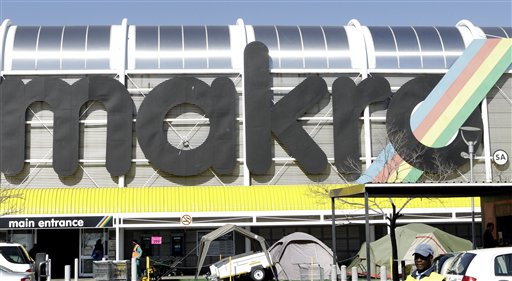South African regulators allow Wal-Mart deal

JOHANNESBURG (AP) — Regulators approved Wal-Mart’s 17 billion rand (about $2.4 billion) bid to buy a controlling share of a South African chain in a ruling Tuesday that followed a fierce debate over protectionism in the country with the continent’s most promising economy.
Unions and government officials are worried the arrival of the world’s biggest retailer will hurt jobs and local manufacturing. In its ruling, the Competition Tribunal, the government agency charged with promoting competition and protecting consumers, said Wal-Mart and South African retailer Massmart could not lay off any workers for two years, must respect Massmart’s existing labor agreements for three years and must invest in training South African suppliers.
Wal-Mart and Massmart had already agreed to take the steps regarding layoffs and union agreements. They also pledged to spend 100 million rand (about $14 million) over the next three years to help farmers and other South African suppliers gear up to do business with Wal-Mart.
The Congress of South African Trade Unions, a key ally of the governing African National Congress, called the tribunal’s approval “almost unconditional” and said Tuesday that its leaders will meet in late June to plan a campaign of marches, demonstrations, pickets and stay-aways to try to keep Wal-Mart out.
The tribunal said Wal-Mart was likely to bring lower prices and “benefit consumers by strengthening rivalry and improving choice.”
It said some losers were inevitable among South African retailers and producers as a result of the decision, but that it chose a path it hoped would make South Africans more competitive.
Arkansas-based Wal-Mart operates in Europe, Asia and across the Americas. Its interest in coming to Africa for the first time has been seen as a vote of confidence not just in South Africa’s economy, but in the continent’s potential.
Wal-Mart CEO and president Doug McMillon said after Tuesday’s ruling he expected the transaction to be completed in a few weeks, and that Wal-Mart would help Massmart with a planned expansion he said would create 2,000 to 3,0000 jobs over the next few years.
Grant Pattison, the Massmart CEO who will continue in that role with the merged company, said shoppers would not see immediate changes in stores that will retain their South African names, but that new products and lower prices would steadily be introduced.
The unions and the government departments of trade, agriculture and economic development had argued Wal-Mart would flood South Africa with cheap foreign goods, forcing other retailers to do the same and putting local manufacturers out of business. They also argued during a week of public hearings before the tribunal earlier this month that Wal-Mart was anti-union, and that that would lead to lower wages and fewer jobs.
Wal-Mart and Massmart say their critics’ case relied less on evidence than fear. Wal-Mart fought for the deal before the tribunal and before the public, setting up a South African website to make its case.
Seeraj Mohamed, director of an economic research unit at Johannesburg’s University of the Witwatersrand, was unconvinced.
“Once Wal-Mart enters your economic system, it’s like having a really strong and virulent weed or fish,” he said in an interview. “They come in and totally change the environment, and other species die out.”
But John Luiz, director of international programs at the university’s business school, said South Africans should see the arrival of Wal-Mart as an opportunity to become part of the international supply chain.
“It is now up to the suppliers to show their worth and to take advantage of this opportunity which they would not have had without the Wal-Mart entry,” Luiz said, adding the Wal-Mart also would have to prove it isn’t anti-labor.
Opponents had wanted Wal-Mart and Massmart to be forced to buy a certain percentage of goods locally, a condition the companies argued violated world trade agreements and was not guaranteed to be an efficient or effective way to safeguard jobs.
The deal was overwhelmingly approved in January by Massmart shareholders. Those include South Africa’s government-owned Public Investment Corp., which invests on behalf of civil service pension funds, and Scotland’s Aberdeen Asset Management. Massmart workers, most of whom are black, also have a stake through a trust set up as part of a South African campaign to help those denied economic opportunities under apartheid.
Wal-Mart has 8,692 stores in 15 countries, among them Brazil, China and India.
South Africa’s Massmart operates in more than a dozen African countries, so buying in means Wal-Mart will have access to more than just 50 million South African consumers.
Africa’s middle class is growing, but many on the continent still struggle. Massmart strategies include extending short-term store credit to hawkers. Some of the micro-entrepreneurs who stock their stalls with fruit, candy and other goods from outlets of Makro, Massmart’s big box chain, have grown into small businesspeople.
Companies like Ford and Disney are expanding business in South Africa, seen as both a gateway to the rest of the continent and an important market in its own right despite high rates of poverty and unemployment.
Deputy President Kgalema Motlanthe, speaking at an economic development conference this week, insisted South Africa was open for business, and expressed concern that current levels of private investment were too low to sustain growth. South Africa’s economy grew by 4.8 percent in the first quarter of 2011, the government announced Tuesday, marking a slow but steady recovery from the global recession.

